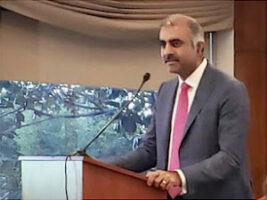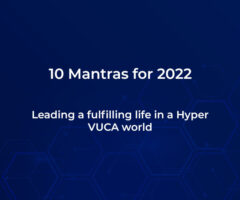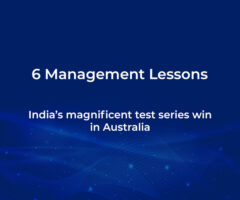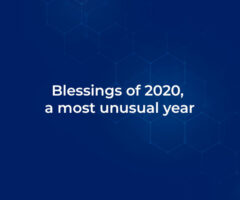Talk at Sri Aurobindo Ashram, Pondicherry, December 12, 2013
It is a real privilege for me to be here at the Sri Aurobindo Ashram and spend the day with you. I have been asked to share thoughts on evolution of leadership. I feel very humbled by this ask as I am a mere student in this field not a learned master. I will attempt my best to share with you some of my experiences in leadership over the past 25 years and what I have learned from them.
I would like to structure my talk in 4 parts and cover the following topics with you:
- My evolution as a leader
- Why broadening the consciousness is so necessary
- Dilemmas that I face on the journey
- How I have tried to progress on the journey
Evolution as a leader
I have been fortunate that I have had some incredible leadership opportunities in my student and professional life. Each of them has helped me discover a next level of consciousness and evolve as a leader. I would like to share 3 sets of experiences and how they have helped me evolve – 1) self and task focus, 2) people development and focus on giving not getting, and 3) society and focus on sustainable development.
1. Aravali Hostel, IIT Delhi – Task Leader
My first significant experience was my hostel in IIT Delhi. The 4 years I spent in IIT Delhi were an incredible growing up experience. I had the opportunity to be the Sports Secretary of my hostel in the 3rd year and the House Secretary in the 4th year. IITians are very competitive, and this is not just in academics but extends to sports and co-curricular activities as well. I was ignited by that competitive spirit. I was totally driven by the ambition to help my hostel Aravali be the best in IIT and win all the championships. I set very clear goals for myself and the hostel. We built a great team that was infused with the same passion and we achieved great success together. We won the Sports Championships in great style in my final year dominating across sports. Moreover, we won the Best Hostel trophy in 3 out of my 4 years at Aravali.
While I built a dedicated team and a great following, at heart I was a task leader. My single-minded focus was victory for my hostel. That clear and energizing goal generated tremendous energy and was a life-shaping experience for many of us. However, there was a flip side to it. It made us over-competitive, which brought conflict with the other hostels. Moreover, we were not able to take everybody along even in our own hostel. Those who were not into sports or co-curricular activities perhaps saw me as being “over the top” aggressive and arrogant. All of this meant that while Aravali Hostel got great success during my stay, the success was not sustained. Once I graduated there was much conflict within the hostel and it fell from the pre-eminent position it had achieved.
2. McKinsey Knowledge Centre – Task + People Leader
The second stage of my evolution as a leader was the opportunity to lead the McKinsey Knowledge Centre, or what is popularly called McKC, from 2002 to 2010. But there is a story before that, which has got much to do with the work I finally ended up doing at McKC. After graduating from IIT, I worked for a while and then did my MBA from IIM Lucknow, where I topped in the MBA program. From there, I joined McKinsey & Company, a leading management consulting firm, which was then the highest paying and most coveted job for a MBA graduate in India. After a nice step-by-step career path, which was a dream run for a middle-class boy growing up in India in the 1990s, I decided to leave McKinsey in 2000 to set up a venture of my own. My venture, ActiveKarma was a grreat disaster. We got the market timing all wrong, over-estimated the market by 10,000 times and blew up our money too quickly!! Failure of my venture was a big blow, not just financially but emotionally. That was the first time in my life I faced failure. That taught me a lot about life. I learnt that life is not a deterministic equation with well defined relationships between inputs and outputs. There are many factors that you don’t control so acceptance of your situation and humility are very important. Getting this reality check in life was a big boon as I embarked on the next stage of my life journey.
After ActiveKarma, I rejoined McKinsey in 2002. However, instead of going back to Consulting I chose to do something different. McKinsey had a small knowledge centre in India which acted a research back-office for the consulting teams. I chose to join McKC as I felt that it was a great opportunity to learn to build and manage a new business, which I realized I did not know well when I did my venture. The dynamics of McKC were very different from McKinsey Consulting. Consulting was the front-office where even as a young consultant you interact with CEOs, while McKC was the back-office far away from the spotlight. In Consulting, the “value addition” for me was immense. I was working with senior, highly accomplished professionals and learning a lot from them. At McKC, at the age of 30 I was suddenly the boss of a young team, who were all looking up to me as an ex-consultant as having solutions to all their problems.
After the initial euphoria of McKC wore off, I started asking myself if I had made the right choice. McKC felt like a very small place and the personal value addition to me limited. At that point, there came a realization that while I was worried about myself, there were many people who were looking up to me. In being self absorbed, I had not thought about what I was contributing to them. I realized that before I ask for myself, I have to hold the mirror to myself and have to ask what I am giving to others. This growing of consciousness brought a big change in my approach. I became a people leader. I started worrying less about myself and more on how to coach & develop my colleagues and create opportunities for them. As I did that something magical happened – my team members flowered, and they in turn drove the growth of McKC from being a research back-office to becoming an innovation hub for McKinsey. McKC grew from 30-40 people to over 700 knowledge professionals across numerous research disciplines and diverse service lines. McKC is now perhaps the largest knowledge centre of its type in the world and the acknowledged pioneer in high-end research & analytics from India. Such magical growth would not have been possible with me driving alone. This was the work of a generation of empowered and committed professionals. I think my evolving from focus on self and the task at hand to people focus had much to do with unlocking the enormous potential of McKC. As McKC grew, it naturally helped me grow more as a leader. I learnt very vividly from this experience that if you focus not on getting for yourself but on giving to others, you will eventually get back lot more in return.
3. Fidelity + NASSCOM – Task + People + Society Leader
My next stage of evolution came with the decision to leave McKinsey. After a 12 year career with McKinsey, spanning over 14 years, I felt it was time to leave McKinsey. Working for a great firm like McKinsey has many advantages but it can pose a few limitations as well. I felt that my entire being was getting defined by McKinsey and it was important that I discover myself. At that stage I joined Fidelity, a global asset management firm. This change led to broadening of my perspective in many ways. While McKC had helped me grow from being a task leader to a people leader, in hindsight my perspective towards life was a bit narrow. My entire life was dedicated to McKinsey and the people there, which did not leave mental and physical capacity for anything else. As I moved out of that environment, I realized there was much more to life. In McKinsey I was fully responsible for a line of business. In Fidelity now that I was overseeing multiple businesses/functions, it gave me the opportunity to step back and take a broader perspective. I realized that I had reached a stage of life where I had a responsibility to give back to the industry and society that had given me so much. I then started getting involved in NASSCOM, which is the industry body in India for the IT and BPO industry. This has helped me broaden my horizons and grow my contributions beyond self and my company to both the industry and society in many significant ways.
I have been leading work on defining the vision for multi-national companies like Fidelity who are a part of the IT and BPO industry in India. This has helped raise consciousness across the industry of the tremendous opportunity for Offshore Centres to grow beyond being transaction processing shops to becoming hubs of value addition and innovation for their global businesses. On a different front, I have been involved in defining the role of industry leaders as good citizens and contributing to the social development of the communities we are a part of. Fidelity Worldwide Investment’s operations in India are based in the city of Gurgaon, which is one of the largest hubs of IT and BPO industry in India. However, despite being a new, modern city, Gurgaon faces a host of civic issues that threaten not just the future of the industry here but its entire sustainability as a large urban centre. We have realized that for our businesses to be sustainable, we as industry leaders have to broaden our agenda and contribute to improving the civic and social infrastructure, which in the past we might not have seen as our responsibility. Consequently, we have taken up a range of issues affecting Gurgaon and the state of Haryana. These have included improving the public infrastructure for commuting in a new city that is getting totally clogged, putting attention on women’s safety, and improving the education standards in the local colleges in Haryana to improve employability of the local talent. It is a long road to making significant impact on these social initiatives, but I am delighted that we have at least begun the journey.
This involvement as a society leader has given me a broader perspective on life. It has helped me grow from being a somewhat one-dimensional corporate leader to a more multi-dimensional human being. I now have more awareness of the many problems our cities and at some level country faces, and role of business in ensuring sustainable development. This has brought more maturity and depth of vision in my day job as the Country Head for Fidelity allowing me to approach issues with a more balanced and long-term approach. Moreover, I have had the opportunity of interacting with many inspiring leaders from outside the corporate world that I might not have interacted with otherwise. Many of them are successful entrepreneurs and business leaders who have left flourishing careers and dedicated themselves to serving the society in different ways. This has brought me fresh perspectives on the purpose of life. It has reinforced for me that given we have got the wonderful gift of human life, we have a responsibility to go beyond self and make a broader contribution so we leave the world a better place.
Why broadening the consciousness is so necessary
I feel very fortunate that I have got many opportunities to progress on the journey of broadening my consciousness. I feel I am still in early stages and there are miles to go and much more to discover. However, I feel convinced that this path of going beyond self and continually expanding the consciousness is the right path. It provides answers to some of the fundamental problems that we face as individuals and collectively as humanity.
For the individual
Broadening of consciousness has given me the answer to how to break out of the “rat race” that many of us who work in the business world are caught in. We are in the age of hyper-consumerism, where there are many attractions and temptations. We are always running after outer trappings of success – money, possessions, power and position. However, this is a trap. We are caught in a never stopping treadmill of desires and expectations. The faster we run and more success we get, the more our desires keep on rising, and the treadmill keeps on running faster and faster. We can never find true peace and happiness as long as we are on the expectations treadmill. Faster we keep on running to catch up, more our stress keeps on rising. Eventually we get fatigued and lose our spirit and start going through the motions of life like a mechanical robot. Many of my friends are mid-career, in their 40s, with 20 years of experience and perhaps another 20-40 years to go. Most of them are very successful by any conventional yardstick – in senior positions in great companies, and earning more money than what you would ever need. However, I often sense emptiness and boredom in many of them; many even talk about retiring in a few years!! This is scary!! Cleary, going beyond self and broadening your consciousness is necessary to finding sustained happiness and peace, and making the most of this gift of human life.
For society
The current mental and economic models focused on profit maximization are clearly limited. We have seen implications of the current economic models in form of grave global economic crisis in recent years. These crisis originated not in the poor nations of the developing world but from the rich economies of the western hemisphere. Greed and incessant desires has led to excess consumerism at the individual level and unethical & fraudulent behaviour at the organization level. This has led to a crisis that challenges the very foundations of the materialistic economic model that has been the norm for the past few centuries. Problems that we currently see in various economies and organizations cannot be solved by the mental models that created them. To solve them needs a new, broader consciousness.
Dilemma – Spirituality vs. Materialism
So we have talked how going beyond self and broadening consciousness is necessary for not just evolution as a leader but for sustained happiness in the human life. However, progressing on this path is not easy. There are many dilemmas and challenges that a seeker has to acknowledge, understand and resolve.
Broadening consciousness is the spiritual path. It is about going deep within yourself and connecting with your inner core. That allows you to understand the unity and connectedness of all existence. This to me is the entire foundation of broadening your consciousness. This is the path of what Hindu philosophy calls Dharma and Moksha – doing the right thing and freedom, two of the higher goals of human existence.
However, the reality is that we live in an imperfect world, a material world. While we have the higher goals of Dharma and Moksha, there also exist the powerful pull of Kama and Artha. Kama is about seeking pleasure. It is fulfilling the needs of your senses i.e., sight, smell, taste, touch and hearing. Artha is the search for material well-being and success. It is about achieving money, possessions and fame.
Materialism is inevitable. Senses and desires cannot be ignored. These are primal needs that have to be satisfied at the right level. If you ignore them, they will rear their ugly head at unexpected times and bite you. Self-renunciation is a difficult path and prone to failure. We often see so called holy men who have apparently renounced worldly desires falling prey to their senses. If senses and desires are a fundamental part of human nature then why ignore them? Without satisfying them it is very difficult to make progress towards Dharma and Moksha.
Materialism is necessary but excess of it is clearly a problem. In meeting the objectives of Artha and Kama, you can move away from Dharma and Moksha. We have already examined that if you are driven by Materialism then you are walking on a treadmill of desires that keeps going faster and faster and it becomes very difficult to get off it. You get trapped in a vicious cycle and do not find peace. In addition to greed there are two more emotions, envy and fear that pose a challenge. We often keep on comparing our situation with others, which causes much grief and heartburn. The entire conflict in the great epic Mahabharata was because of envy and we see similar patterns playing out in our daily lives in some form. The other challenge is fear or insecurities that narrow our consciousness to self-perseveration and make us take short-cuts. I often see this getting reflected in office politics that I personally find challenging to handle. I feel the root cause of politics is self-preservation and self-advancement. Even if you don’t want to play politics, you have to be aware of it to survive and be effective in an organization.
Progressing on the spiritual path of broadening your consciousness in a material world does pose some deep challenges and dilemmas. You cannot ignore the pulls and pressures of the material world, yet you cannot allow them to overpower you and suck you into a vicious cycle. Clearly, extreme of either spirituality or materialism will pose challenges – the former being unrealistic and the latter being undesirable. So, it is necessary that we find balance between the seemingly contradictory paths of Spirituality and Materialism.
Progressing on the path – finding balance between Spirituality and Materialism
Clearly, finding unity and alignment between Spirituality and Materialism is very necessary. However, the big question is how you find the golden balance? Many people might start from a high moral ground. However, daily struggle between moral uprightness and material well being is too much for most and they loose the way. So what practical guidelines and practices can help in living this balance on a daily basis?
Hindu scriptures provide a good answer. They have identified 4 paths towards self-realization – Karma Yoga (path of action or service), Raja Yoga (path of meditation), Gyan Yoga (path of knowledge) and Bhakti Yoga (path of devotion).
Each one of us has to find our own path or combination of paths based on our nature. I find the paths of Karma Yoga and Raja Yoga to be most inspiring and aligned to my nature, and would like to share my beliefs and experiences with them (for simplicity, I will be using the terms Karma and Yoga & Meditation respectively).
Karma
The essence of Karma is action, to focus on the deed in front of you. Karma to me is one of the few unambiguous realities of life. You cannot go wrong with Karma. Karma is the route to success both in the material world and the spiritual world. In either case, you have to focus on the action in front of you. I would like to present three ideas on how to find balance between spirituality and materialism via the path of Karma.
First, approach Karma with the objective of Dharma or doing the right thing. Often our Karma is driven by search for Artha or material well-being. There is nothing wrong with that. We just need to ensure there is the balance with Dharma. Where there is a conflict between the two, Dharma or doing good and service to others should take precedence. Let go of your self interest and seek to give and to add value to people and situations around you. Focus on “We” not “I”. As you do that, something magical will happen. You will grow as a leader and as a human being, and eventually more success will come to you.
Second, remember Gita’s guidance to be dispassionate and not to obsess about the outcomes. It is easier said than done and I certainly struggle with this concept. It is counter to how I have operated through most of my life. I like to set challenging goals and then work hard towards achieving them. However, as I have progressed in life I have realised that you can not control all outcomes. The only thing you can focus on is the action in front of you. If you attach too much weight to achievement of desired outcomes it will lead to feverishness in action and lot of stress in life.
Third, beware of inaction. Sometimes a misguided interpretation of spirituality can dull the focus on Karma. You have to face up to whatever situation you are in. Even if it is a difficult and seeming uncontrollable situation, you need to act with courage and get on with actions in your control. Escapism can never be the answer. That is where I feel India has faltered over the past centuries. It is ironical that the civilization that gave the world Gita – the most beautiful possible inspiration for Karma – lapsed into fatalism and dullness. In contrast, I believe the Protestant work ethic was a significant reason for Western Europe’s rise from Dark Ages to become a dominant civilization. It is time we rediscover the powerful messages of Gita. It says “Perform necessary action; it is more powerful than inaction”. Do not renounce the world and become a hermit. Instead, learn to change your attitude while living and working in the world.
Yoga & Meditation
It is very easy to lose ourselves in the incessant action of lives. It can feel like sleepwalking where you just drift from one scene of a movie to another. It is very important that we have coping mechanisms that help center us and find silence within ourselves. Yoga and meditation is a great way of doing that. It can calm you and provide a medium to help connect with your inner self. It encourages focus on breathing, which is a great way to link and energize different levels of your existence – mind, body and soul. Moreover, from the calmness and silence can emerge the most profound and creative ideas and guidance for every difficulty. I find that if I close my eyes, still myself and focus on my breathing, I can find clarity and solutions to whatever problems might be troubling me.
Yoga and meditation are a practical option for all of us who might be immersed in material pursuits. If you can inculcate the discipline of regular practice of Yoga & meditation, you can find spiritual balance even while living in the material world.
Karma Yoga, Raja Yoga and also the paths of Gyana Yoga and Bhakti Yoga provide very good guidance. However, all of us need to find our own specific path and our own individual balance. There are no deterministic answers; you have to go through a process of personal questioning, self-reflection and self-discovery. What is experienced by own self leads to a more intimate understanding of the right path and conviction to move forward resulting in clear, concrete actions.
*****
I hope the above experiences and learnings prove helpful for you. Progressing on the path of broadening your consciousness is a very rewarding journey, both for self and for the society. I wish you the best that you find your path and progress well on your journey!!



